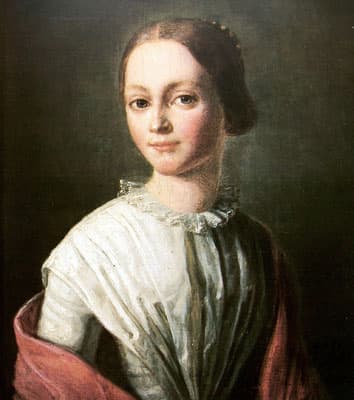Cosí fan tutte is the least performed of the Mozart–Da Ponte operas. The comedy of Le Nozze di Figaro and the travails of our favourite libertine in Don Giovanni were much more popular. The uncertain and changing morals of Cosí fan tutte, despite it being an opera buffa, made a more difficult proposition.
The story of two men who test their fiancées’ faithfulness with the most outrageous antics resulted in some of Mozart’s most beautiful arias and ensembles. Sometimes we’re hard-pressed, though, to remember who’s who.
The opera opens with two friends, Guglielmo and Ferrando. Guglielmo is engaged to Fiordiligi and Ferrando is engaged to Dorabella and proudly boasts of both their beauty and constancy.
The meddler Don Alfonso bets them that the fiancées that the men declare to be so faithful are anything but. For 100 sequins, Don Alfonso bets the two men that the women (like all women) will break their engagements at the slightest opportunity. We are dropped into their conversation in the middle, with Don Alfonso already having declared his position.
Wolfgang Amadeus Mozart: Così fan tutte, K. 588 – Act I Scene 1: Terzetto: La mia Dorabella capace non è (Stuart Burrows, Ferrando; Thomas Allen, Guglielmo; Richard van Allan, Don Alfonso; Royal Opera House Orchestra, Covent Garden; Colin Davis, cond.)
For the audience, it’s critical to remember who’s engaged to whom. The easiest way is to remember that, at the beginning, Ferrando (F) is NOT engaged to Fiordiligi (also F).
The second scene opens with the sisters, Fiordiligi and Dorabella, comparing miniatures of their fiancés that they wear as necklaces.
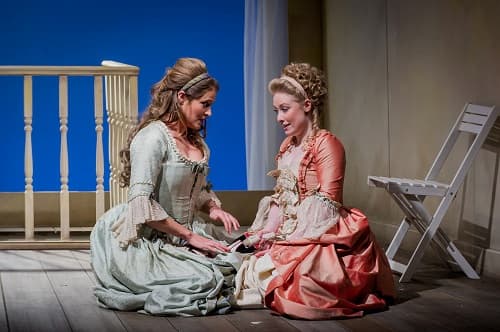
Samantha Clarke as Fiordiligi and Sarah Gilford as Dorabella – Sarah Gilford, 2016, RNCM (Photo by Robert Workman)
Don Alfonso enters to tell them the news that their men have been called up to war and will be leaving immediately. At the rattle of a drum, the men embark on a ship and depart.
Wolfgang Amadeus Mozart: Così fan tutte, K. 588 – Act I Scene 2: Bella vita militar! (Stuart Burrows, Ferrando; Thomas Allen, Guglielmo; Richard van Allan, Don Alfonso; Kiri Te Kanawa, Fiordiligi; Agnes Baltsa, Dorabella; Royal Opera House Orchestra, Covent Garden; Colin Davis, cond.)
And, just as immediately, Don Alfonso brings in two men he describes as old friends, two outrageously dressed Albanians, who are actually Guglielmo and Ferrando in disguise.
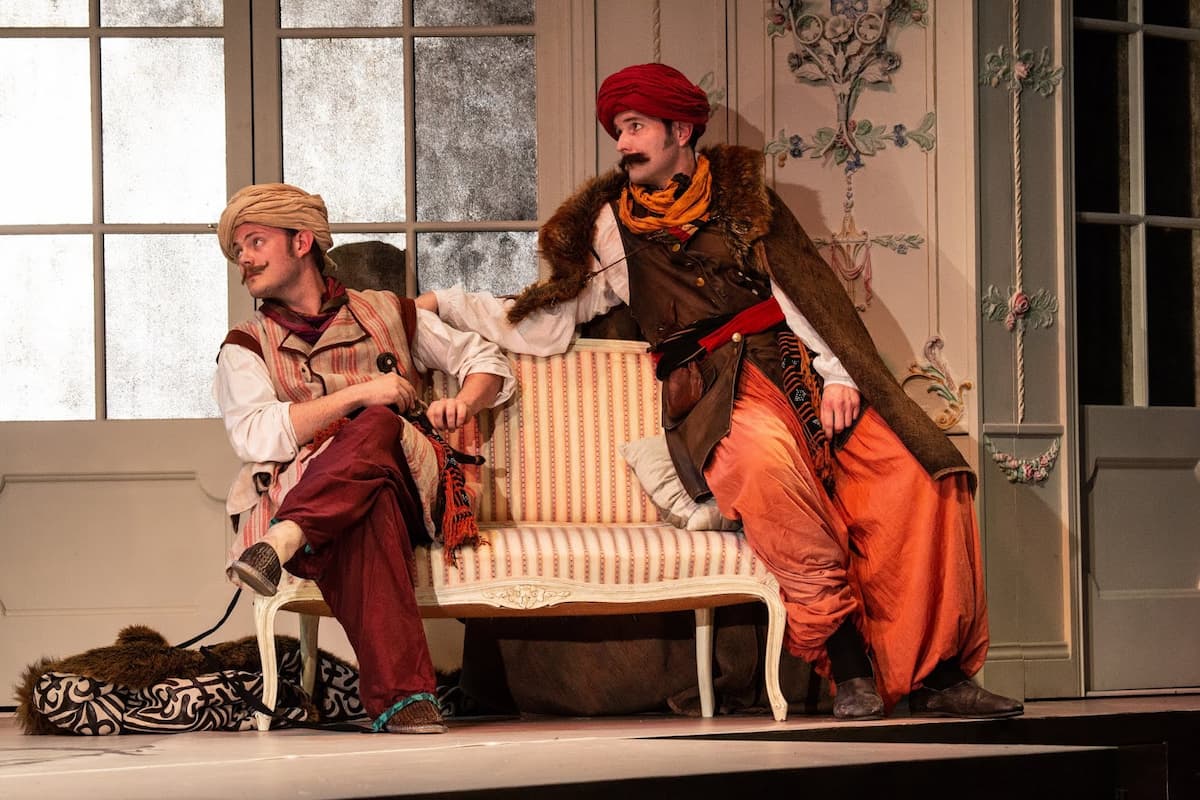
The Albanians (Nick Pritchard and Nicholas Lester), Opera Holland Park (Photo by Robert Workman)
The sisters are outraged that Don Alfonso, with the help of their maid Despina, would bring strange men into their house.
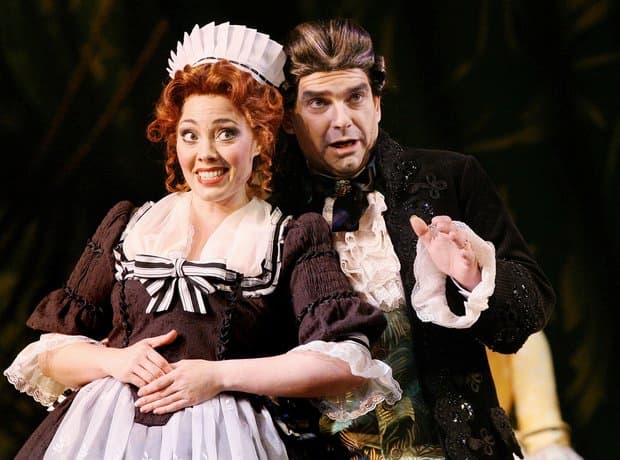
Tiffany Speight as Despina conspiring with Gary Rowley as Don Alfonso, 2005, Victorian Opera
The first glimpse of character we have comes when the Albanians (who are left nameless) express their interest in the sisters. Fiordiligi’s aria ‘Come scoglio’ declares that, like a rock beset by wind and storm, she will stand firm.
Wolfgang Amadeus Mozart: Così fan tutte, K. 588 – Act I Scene 2: Recitative: Temerari! Sortite fuori di questo loco! (Stuart Burrows, Ferrando; Thomas Allen, Guglielmo; Richard van Allan, Don Alfonso; Kiri Te Kanawa, Fiordiligi; Agnes Baltsa, Dorabella; Royal Opera House Orchestra, Covent Garden; Colin Davis, cond.)
So now that leaves Dorabella’s character to be delineated. But first, we have a suicide scene, where the Albanians rebuffed by the steadfast sisters, pretend that they have taken arsenic in despair. Despina and Don Alfonso rush off to find a ‘doctor and an antidote’, leaving the sisters to nurse the supposedly dying men.
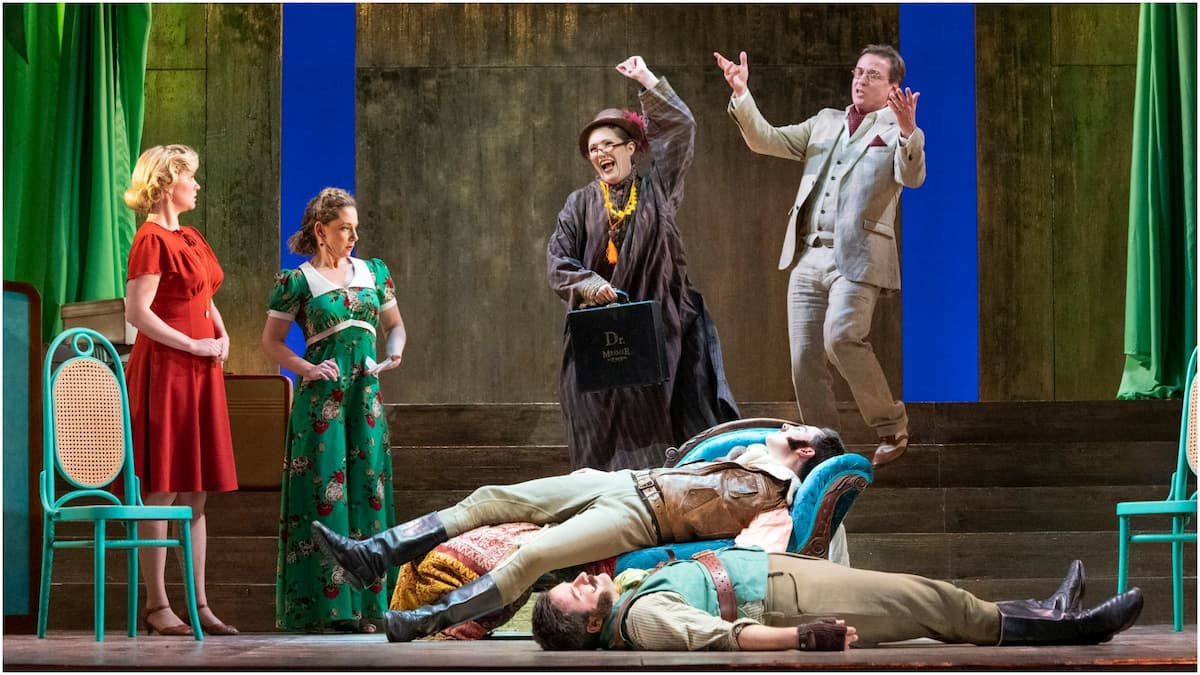
Doctor Despina to the rescue (Joanna Marie Skillett as Fiordiligi, Martha Jones as Dorabella, Jenny Stafford as Despina, Stephan Loges as Don Alfonso, Frederick Long as Guglielmo, and Tom Elwin as Ferrando ), 2020 English Touring Opera (Photo by Richard Hubert Smith)
Dorabella, approaching the men, is the first to say that their faces are quite interesting, but doesn’t go further than that. Despina, disguised as a doctor, ‘cures’ them with a magnet and encourages the sisters to kiss them, which they indignantly refuse.
Act 2 begins with Despina laughing at the sisters’ faithfulness, declaring that they’re not acting like women, because women treat love lightly. Women who trust men have misfortune as their future; they should ‘Mangiar il fico e non gittare il pomo. / Eat the fig and don’t throw away the apple’. When the Albanians appear, they press their suits even more forcefully. Guglielmo, paired with Dorabella, is able to take away Ferrando’s miniature from her locket and substitute a heart. They exit arm in arm – Dorabella has proved to have the softer heart.
Fiordiligi, in keeping with her earlier hard-hearted rock metaphor, is more difficult to sway. But, now she isn’t being wooed by the unimaginative Guglielmo, but the more passionate Ferrando. Just as the sisters had different characters, so did the two friends. Fiordiligi maintains her separateness, but she’s hearing an affection she hasn’t had before from her fiancé. Things may change!
The two men come back tighter to report their progress. Ferrando can only report that Fiordiligi was ‘keeping herself pure as a dove’ and had fled. Guglielmo, on the other hand, cautions Ferrando that having a doubt might not be a bad thing… and by the way, here’s a picture she gave me.
Wolfgang Amadeus Mozart: Così fan tutte, K. 588 – Act II Scene 2: Recitative: Amico, abbiamo vinto (Stuart Burrows, Ferrando; Thomas Allen, Guglielmo; Royal Opera House Orchestra, Covent Garden; Colin Davis, cond.)
So, by the end of the first day after their fiancés have departed, Don Alfonso sums up the situation to Ferrando that ‘Fiordiligi has remained Faithful to Guglielmo, But Dorabella’s unfaithful to you’. Ferrando is outraged that Dorabella would be such a traitor…never considering that in making love to Fiordiligi, he’s been a traitor to Dorabella himself.
In a conversation with her sister and Despina, Fiordiligi confesses that her Albanian has made her fall in love with him, but she’s being torn by her vow to Guglielmo. Despina, of course, advises her to just marry her Albanian, and then Guglielmo can’t do anything about it.
Wolfgang Amadeus Mozart: Così fan tutte, K. 588 – Act II Scene 3: Recitative: Ora vedo che siete una donna di garbo (SKiri Te Kanawa, Fiordiligi; Agnes Baltsa, Dorabella; Daniela Mazzucato, Despina; Royal Opera House Orchestra, Covent Garden; Colin Davis, cond.)
Fiordiligi decides instead to wear men’s clothes and join the army to be with her beloved. Ferrando, seeing her dressed in military clothes, declares that her departure will be his death because he will die of grief. At this Fiordiligi decides that she must yield to save him. Guglielmo, observing this, is about to intervene, but Don Alfonso holds him back.
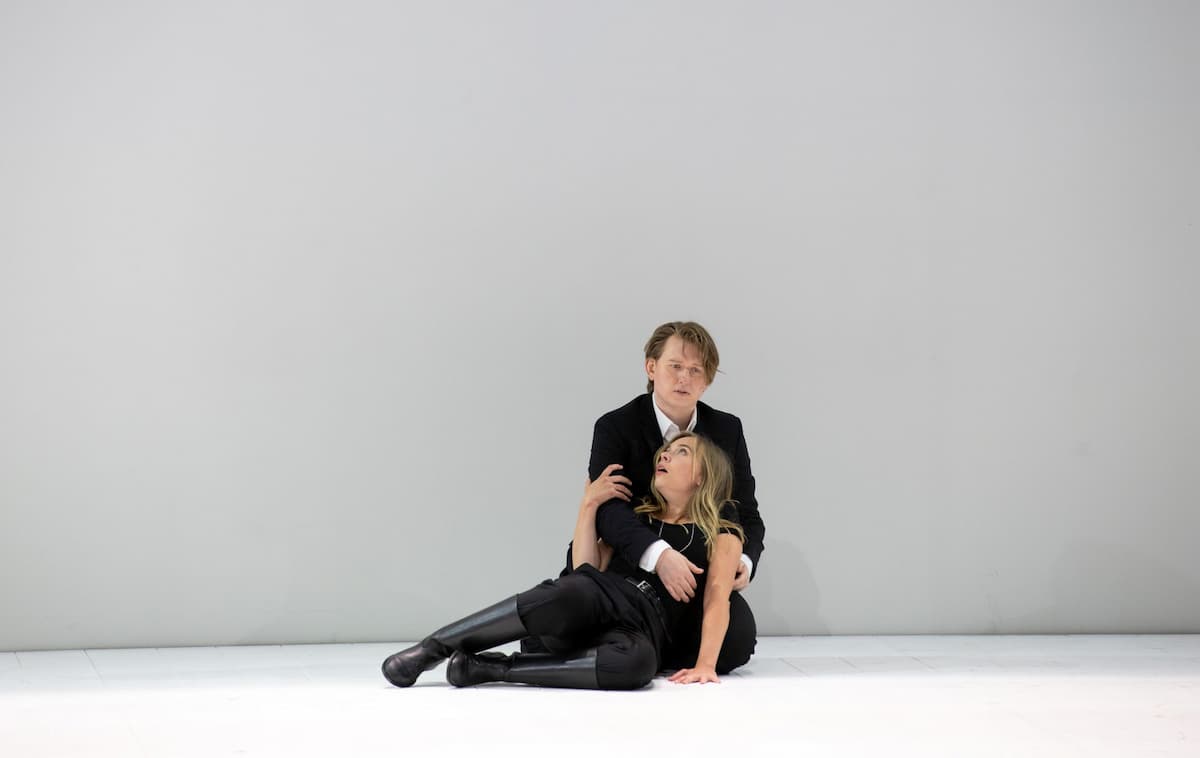
Fiordiligi (Elsa Dreisig) falls for Ferrando (Bogdan Volkov), 2020, Salzburg Festival (Photo by Monika Rittershaus)
When the three men strategize again, Don Alfonzo’s advice is strangely like Despina’s: the Albanians should marry the sisters (ignoring the fact that each man is paired with the other’s fiancée).
And so we go to the end: a wedding is arranged, Despina, mistress of disguises, comes as a notary to register the marriages, and then the opening march is heard again: the lovers are back from war. How many changes in a day! Women’s hearts switch affection and wars are ended.
Wolfgang Amadeus Mozart: Così fan tutte, K. 588 – Act II Scene 4: Miei Signori, tutto e fatto (Stuart Burrows, Ferrando; Thomas Allen, Guglielmo; Richard van Allan, Don Alfonso; Kiri Te Kanawa, Fiordiligi; Agnes Baltsa, Dorabella; Daniela Mazzucato, Despina; Royal Opera House Chorus; Royal Opera House Orchestra, Covent Garden; Colin Davis, cond.)
The wedding feast is interrupted by the arrival of the two men (the Albanians having been bundled into a side room), the marriage contract is discovered and the men seek out the mythical Albanians. They go into the room where the Albanians have hidden and emerge in their clothes – Guglielmo returns Ferrando’s portrait to Dorabella and Ferrando bows to Fiordiligi. All is revealed!
Fiordiligi and Dorabella accuse Don Alfonso of deceiving them and he just laughs at everyone’s undoing. In the end, even Despina is ashamed of her actions in misleading the sisters. In a strange change of mood at the end, the final ensemble has everyone declaring that everyone should follow reason rather than emotion in their lives.
Wolfgang Amadeus Mozart: Così fan tutte, K. 588 – Act II Scene 4: Sani e salvi agli (Stuart Burrows, Ferrando; Thomas Allen, Guglielmo; Richard van Allan, Don Alfonso; Kiri Te Kanawa, Fiordiligi; Agnes Baltsa, Dorabella; Daniela Mazzucato, Despina; Royal Opera House Orchestra, Covent Garden; Colin Davis, cond.)
What’s not clear, and what is up to every director to decide, is who gets paired with whom at the end? Do the two Fs (Fiordiligi and Ferrando) end up together or does everyone go back to their original fiancé / fiancée? Most performances return to the original couples, but it really isn’t specified in the text!
As can be seen from the huge variety of sets and costumes in the pictures above, Così fan tutte has been taken as a kind of universal story. The original stories about fiancé/fiancée swapping can be traced back to the 13th century and show up in authors such as Boccaccio and Shakespeare. Following its premiere on 26 January 1790, the opera received only 5 performances in Vienna before the death of Joseph II closed all the theatres. Five more performances followed and then it fell off the stage for decades. In the 19th century, the topic of the opera, the quality of the music notwithstanding, was felt to be too risqué or immoral and the storyline was often cleaned up for performances. It wasn’t until the mid–20th century that, Così fan tutte came back into the repertoire and is now standard on international opera stages.
For more of the best in classical music, sign up for our E-Newsletter



